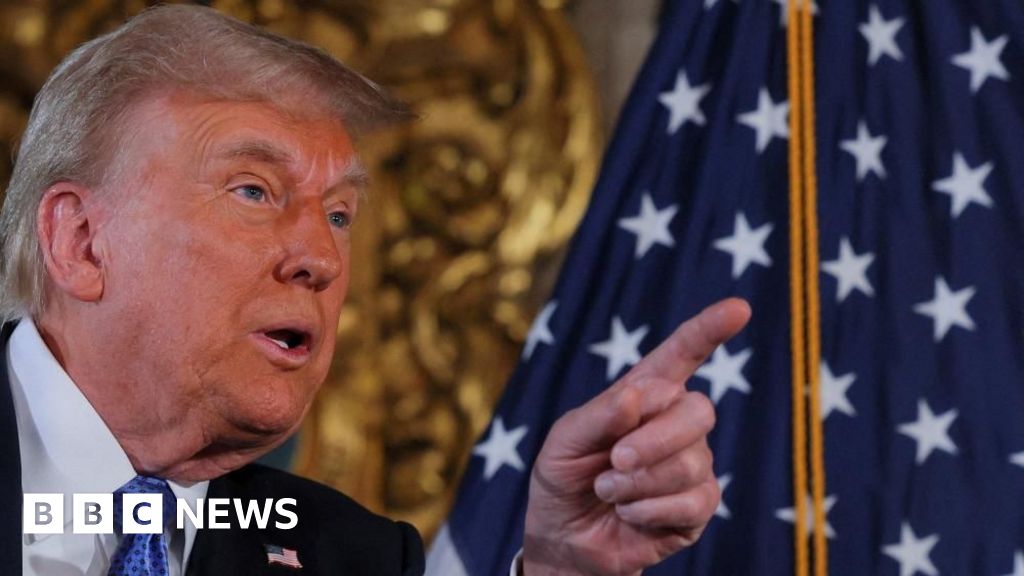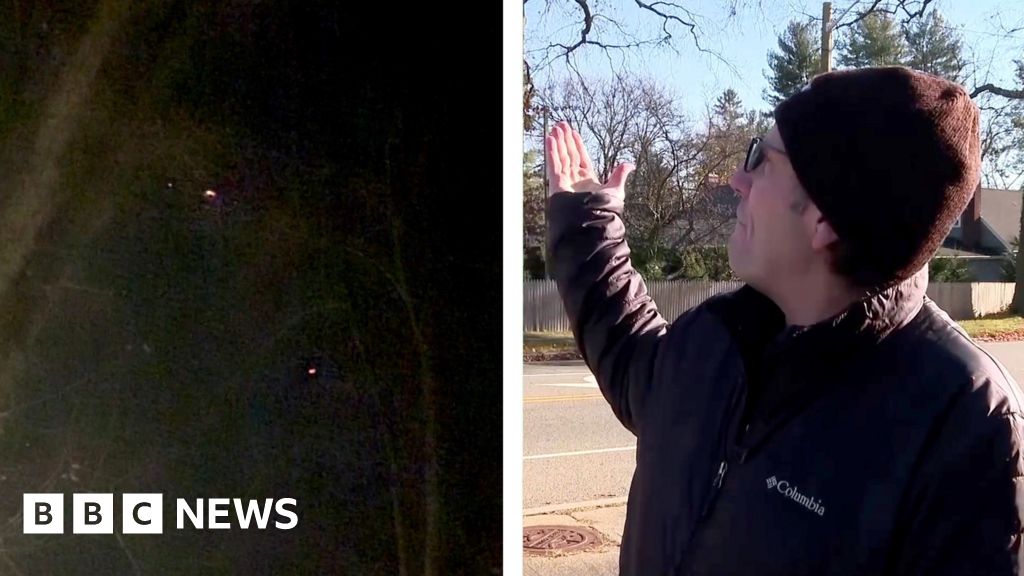ARTICLE AD BOX
Image source, Getty Images
Since taking office in January, US President Joe Biden has been beset by a string of crises at the southern US border.
From criticism over deportations and the treatment of Haitian immigrants to an influx of unaccompanied children and concerns about Covid, there's been no end to the challenges the administration faces along the border with Mexico.
Despite those challenges, Mr Biden has vowed to make good on sweeping promises to reform US immigration, vowing to "take urgent action" to undo the policies of Donald Trump.
Border detentions spike to 21-year high
While the number of migrants at the border had been steadily increasing since April 2020, the numbers spiked sharply after Mr Biden took office.
Migrants continue to cross the border in one of two ways. Those who "have suffered persecution or fear that they will suffer persecution" in their home country are eligible for asylum when they present themselves at a port of entry for admission into the US.
Others may evade immigration inspectors and border patrol by hiding in vehicles or travelling undetected across unprotected and often treacherous sections of the US-Mexico border.
According to the Pew Research Center, at least 40% of unauthorised migrants in the country entered legally on short-term visas and overstayed.
While Mr Biden has avoided the harsh rhetoric of Donald Trump, his predecessor, he has still repeatedly called on migrants to not attempt the journey to the US.
In August, over 208,800 people were detained crossing the border. The figure marked a reduction from July, when 212,672 people were taken into custody - a 21-year high.
Despite the August slight decline, the number of migrant encounters still represents about a 45% increase from the 144,000 recorded in May 2019 - the highest total during the Trump administration.
There's also been a sharp increase in the number of children crossing the border. Of August's total, 18,847 were teens and children not travelling with a legal guardian, about in line with figures from the previous month.
During the Trump administration, by comparison, the highest number of unaccompanied minors over a single month was approximately 11,000.
Title 42 Expulsions
On Covid, Mr Biden has so far left a Trump-era emergency policy in place.
The policy - known as Title 42 - is aimed at preventing the spread of Covid-19 in holding facilities, officials say. It allows US authorities to automatically expel almost all undocumented migrants seeking entry, bypassing normal immigration laws and protections.
The controversy surrounding Title 42 was starkly highlighted in September, when the Biden administration used the policy as justification to deport nearly 4,000 Haitian migrants without allowing them to seek asylum.
In contrast to Mr Trump, Mr Biden has decided not to refuse entry to unaccompanied migrant children or teenagers. Some families are also exempt.
The Biden administration has defended the Title 42 policy in courts, where civil rights groups have argued that it violates existing US asylum laws. Politicians from Mr Biden's own Democratic Party have also spoken out against it.
The US Centers for Disease Control and Prevention (CDC) said in August that the policy will remain in effect until the spread of Covid by non-citizens stops being a "serious danger" to public health.
It plans to review the situation every 60 days.
Reuniting Families
As mandated by US anti-trafficking laws, Mr Biden's administration has been transferring most immigrant minors to shelters overseen by the government. (Children from Mexico, however, are still being repatriated, which has been criticised by Amnesty International and other organisations).
The administration had previously been criticised for placing migrant children in detention centres at times when shelter space was limited. In response to the influx of unaccompanied children, the administration reopened several previously shuttered detention centres.
Activists - and some fellow Democrats - accused Mr Biden of repeating the policies of Mr Trump, who himself had also come under fire for the detention centres.
In May, the number of children held in those facilities declined by nearly 90% after they were transferred to the Department of Health and Human Services (HHS) for temporary resettlement.
Mr Biden has also reversed a so-called "zero-tolerance" policy under the Trump administration that saw families divided by US authorities, in some cases with parents being deported back to their home countries without their children.
Some families - but not all - have been reunited.
According to a reunification task force set up by the Biden administration in January, 3,913 children had been separated from their families between 2017 and 2018.
A September court filing from the Justice Department and American Civil Liberties Union said that authorities are still trying to reach the parents of 303 children.
The Remain in Mexico Policy
On Mr Biden's first day in office, the Department of Homeland Security (DHS) suspended a controversial Trump-era policy that forced asylum seekers to wait in Mexico for their US immigration hearings.
Efforts to end the policy - known as the Migrant Protection Protocols (MPP) - are now bogged down in legal wrangling.
In August, the US Supreme Court ordered the president to revive it, rejecting a bid to block a Texas-based judge's ruling requiring it be brought back.
DHS has appealed the decision. On Wednesday, it said it would uphold the order "in good faith" but still plans to issue a new memorandum terminating MPP in the coming weeks.
Separately, in late September, Texas' attorney general filed a lawsuit to try force it to be reinstated.
About 70,000 migrants were enrolled in the programme since it was introduced in January 2019.
Shortly after Mr Biden's inauguration, his administration began to gradually process these tens of thousands of people waiting in Mexico, allowing them into the US while their cases are heard.
So far about 13,000 people enrolled in MPP have been allowed to enter the country to await the outcome of their cases.
Refugee cap
On 27 September, the US State Department announced that the government plans to increase the number of refugees allowed into the US to 125,000 for the fiscal year that begins on 1 October.
While still a candidate, Mr Biden had made a reform of Mr Trump's historically low refugee cap of 15,000 a major campaign promise.
In April, however, many of Mr Biden's supporters expressed dismay after his administration announced initial plans to keep the 15,000 refugee cap in 2021.
Following intense public backlash, Biden raised the number to 62,500 refugees.
About 110,000 refugees were admitted to the US in the last year of Barack Obama's final presidential term.
Mr Biden also called for more refugees to come from Africa, the Middle East and Central America, and for an end to restrictions on resettlements from Somalia, Syria and Yemen.
Border Wall
After coming into office vowing not to build "another foot" of Mr Trump's border wall, Mr Biden signed an order on his first day in office to pause all wall construction and to end the national emergency declaration on the southern border.
He later ordered that military funds Mr Trump had tapped for the project be re-allocated, leading to a Republican-requested inquiry into whether Mr Biden had inappropriately re-directed congressionally approved funds.
Property owners near the border have complained that despite the pause, the government is still seeking to seize borderlands for future construction using a process known as eminent domain.
Dozens of eminent domain cases brought by the federal government remain open and could take years for the courts to decide.
Some wall construction sites remain abruptly abandoned, with building materials strewn about, as construction had been ongoing right up until the moment of Mr Biden's order to halt.

 3 years ago
88
3 years ago
88








 English (US) ·
English (US) ·